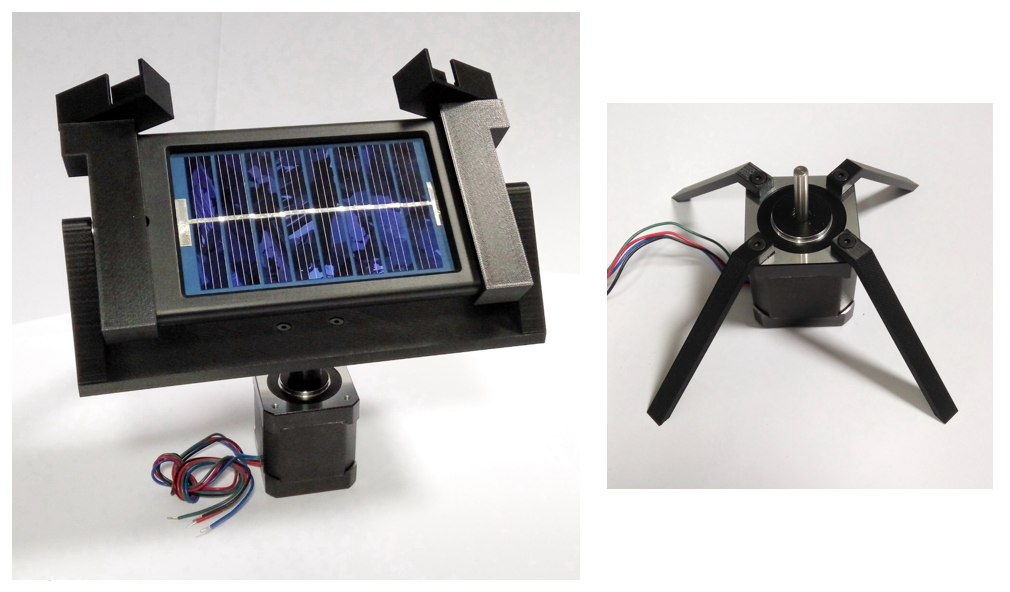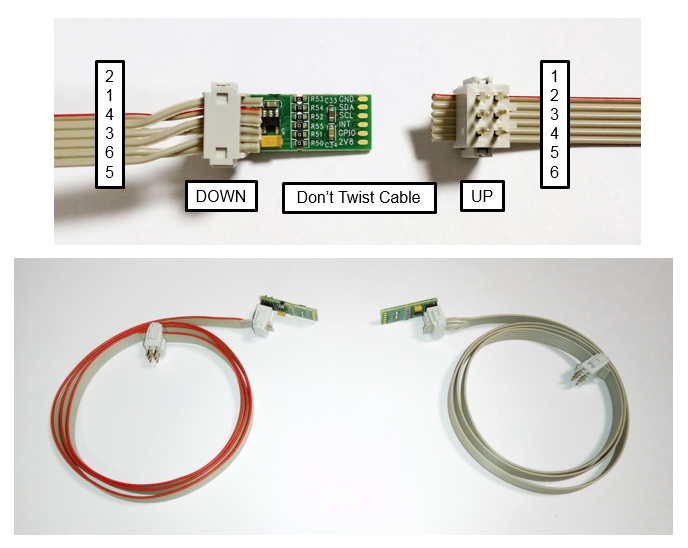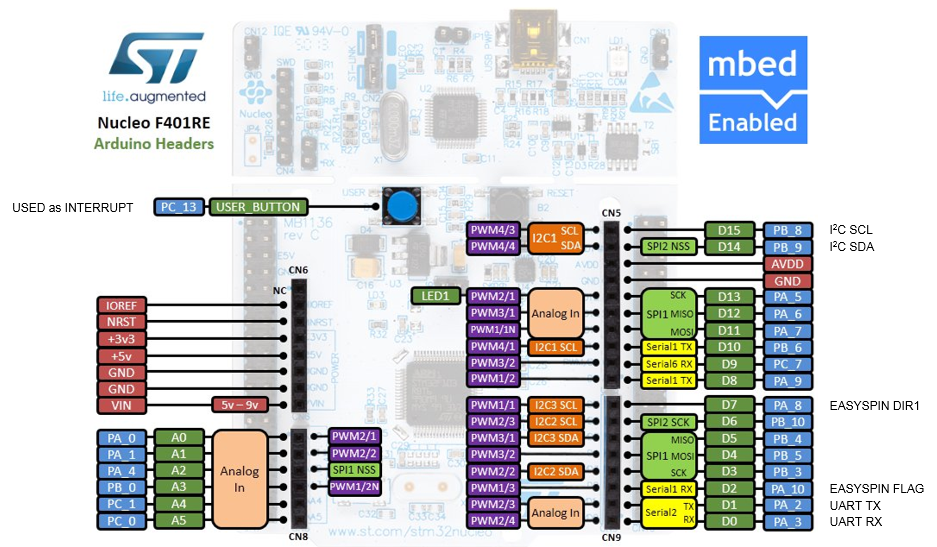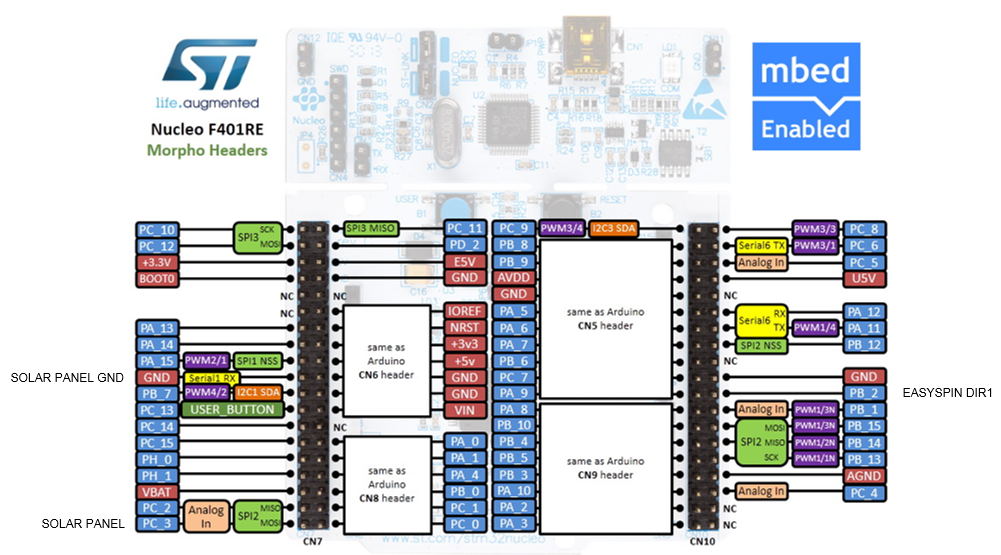SunTracker_BLE
Dependencies: BLE_API X_NUCLEO_6180XA1 X_NUCLEO_IDB0XA1 X_NUCLEO_IHM01A1 X_NUCLEO_IKS01A1 mbed
Fork of SunTracker_BLE by
Overview
The SunTracker is a demo application running on ST Nucleo-F401RE stacking a set of ST X-NUCLEO expansion boards.
Main features provided are:
- A solar panel follows the light source, orienting the panel in order to achieve the best panel efficiency.
- Orientation is controlled thanks to a couple of VL6180X FlightSense light sensors mounted on a X-NUCLEO-6180XA1 expansion board and driven by X-NUCLEO-IHM01A1 controlled stepper motor acting as actuator to orientate the panel.
- The system features a progressive control on the stepper motor in order to modulate the panel rotation speed according to the light angle.
- The application is also able to control the panel productivity reading the panel voltage through an ADC and proving feedback on the local display.
- A manual orientation is possible by using the accelerometer on a X-NUCLEO-IKS01A1 expansion board that, according on board tilt, controls the speed and the rotate direction.
- A remote control is available using a X-NUCLEO-IDB04A1 or a X-NUCLEO-IDB05A1 Bluetooth Low Energy expansion board. Remote control software is here.
![]()
Working Status
- SunTracker has 3 working status visible on FlightSense display and switchable by pressing the User Button:
Status 0 (Idle)
- Motor: Free Turning
- Display: Waiting for User Button
Status 1
- Motor: Driven by Light
- Display: Direction and Light Intensity = Direction and Motor Speed
Status 2
- Motor: Driven by Light
- Display: Solar Panel Efficiency
Status 3
- Motor: Driven by Accelerometer
- Display: Direction and Accelerometer Intensity
Server Startup
- When you plug the power supply, the word ‘PUSH’ is shown on display.
- You can manually rotate the structure to assign the ‘Zero Point’. Then press the User Button to launch the application.
- The display will show this status, which means that the structure is oriented to maximize the efficiency of the solar panel.
- If there is a light displacement, the structure will rotate, left or right, to follow the light source and on display is shown the direction and the speed.
- You can press the User Button to show the panel efficiency with 4 digits that represent the range from 0v (0000) to 3,3v (3300).
- Further pressing the User Button you will manual rotate the panel by tilt the Server or Client accelerometer depending by BLE connection.
Client Startup
- The Client application can remotely control the User Button and the Accelerometer functions.
- Power on the Client AFTER the Server, it will automatically search for the SunTracker and will establish a BLE connection.
- The Green Led on Nucleo Client board will be powered on.
Rotation Features
- It has been implemented a block of rotation to avoid cables twist.
- The blocking point can be set in the firmware by changing a constant.
- You can manually rotate the structure to assign the ‘Zero Point’ before press the User Button to launch the application.
- The system features a progressive control on the stepper motor in order to modulate the rotation speed according to the light or accelerometer angle.
List of Components
SERVER SunTracker_BLE
- Nucleo-F401RE platform using a STM32F401RET6 microcontroller.
- X-NUCLEO-IHM01A1 - Stepper motor driver board based on the EasySPIN L6474.
- X-NUCLEO-6180XA1 - 3-in-1 proximity and ambient light sensor board based on ST FlightSense technology.
- VL6180X-SATEL - Satellite boards compatible with X-NUCLEO-6180XA1 board.
- X-NUCLEO-IKS01A1 - Motion MEMS and environmental sensor board.
- X-NUCLEO-IDB04A1 or X-NUCLEO-IDB05A1 - Bluetooth Low Energy Bluetooth low energy evaluation board.
- Stepper Motor 400’’ (Part Number 5350401) - To orientate the Mechanical Structure.
- Solar Panel 0.446w (Part Number 0194127) - To capture sunlight and generate electrical current.
- Power Supply 12v (Part Number 7262993) - To provide power supply at the Stepper Motor.
- Flat Cable 6 ways (Part Number 1807010) - To plug VL6180X-SATEL with X-NUCLEO-6180XA1 (60cm length each x2).
- Cable Connector (Part Number 6737694) - To plug the Flat Cable (x4).
- Power Connector (Part Number 0487842) - To provide Power Supply to X-NUCLEO-IHM01A1.
CLIENT SunTracker_BLE_Remote
- Nucleo-F401RE platform using a STM32F401RET6 microcontroller.
- X-NUCLEO-IKS01A1 - Motion MEMS and environmental sensor board.
- X-NUCLEO-IDB04A1 or X-NUCLEO-IDB05A1- Bluetooth Low Energy Bluetooth low energy evaluation board.
MECHANICAL STRUCTURE
Find here the STL files to print with a 3D printer.


FLAT CABLE ASSEMBLY

HARDWARE SETUP
Nucleo ADC + Solar Panel
Connect Solar Panel cables to Nucleo Morpho PC_3 (white) and Nucleo Morpho GND (black). Connect a capacitor 10uF between PC_3 and GND to stabilize its voltage value shown on display.
EasySpin (L6474) + BLE
Hardware conflict between EasySpin DIR1 and BLE Reset, both on same Arduino Pin PA_8. Disconnect PA_8 between EasySpin and Nucleo by fold EasySpin Pin. PB_2 has been configured as EasySpin DIR1 in the firmware . Connect Nucleo Morpho PB_2 to FlightSense Arduino PA_8 by a wire.
FlightSense Satellites
In case of instability with I2C due to long flat cables, solder 4 SMD capacitors 47pF on FlightSense board in parallel between R15, R16, R17, R18 and plug 2 capacitors 15pF between FlightSense Arduino PB_8 and PB_9 to GND pin to cut-off noises over 720 KHz.
Arduino & Morpho Pinout


main_only_BLE_BB.cpp.h
- Committer:
- fabiombed
- Date:
- 2016-02-12
- Revision:
- 8:144855fe02bd
- Child:
- 11:b5e23d64d366
File content as of revision 8:144855fe02bd:
/**
******************************************************************************
* @file main.cpp
* @author Fabio Brembilla
* @version V2.0.0
* @date February, 2016
* @brief SunTracker + RemoteControl Vertical Application
* This application use IHM01A1, 6180XA1, IKS01A1, IDB0XA1 expansion boards
******************************************************************************
* @attention
*
* <h2><center>© COPYRIGHT(c) 2016 STMicroelectronics</center></h2>
*
* Redistribution and use in source and binary forms, with or without modification,
* are permitted provided that the following conditions are met:
* 1. Redistributions of source code must retain the above copyright notice,
* this list of conditions and the following disclaimer.
* 2. Redistributions in binary form must reproduce the above copyright notice,
* this list of conditions and the following disclaimer in the documentation
* and/or other materials provided with the distribution.
* 3. Neither the name of STMicroelectronics nor the names of its contributors
* may be used to endorse or promote products derived from this software
* without specific prior written permission.
*
* THIS SOFTWARE IS PROVIDED BY THE COPYRIGHT HOLDERS AND CONTRIBUTORS "AS IS"
* AND ANY EXPRESS OR IMPLIED WARRANTIES, INCLUDING, BUT NOT LIMITED TO, THE
* IMPLIED WARRANTIES OF MERCHANTABILITY AND FITNESS FOR A PARTICULAR PURPOSE ARE
* DISCLAIMED. IN NO EVENT SHALL THE COPYRIGHT HOLDER OR CONTRIBUTORS BE LIABLE
* FOR ANY DIRECT, INDIRECT, INCIDENTAL, SPECIAL, EXEMPLARY, OR CONSEQUENTIAL
* DAMAGES (INCLUDING, BUT NOT LIMITED TO, PROCUREMENT OF SUBSTITUTE GOODS OR
* SERVICES; LOSS OF USE, DATA, OR PROFITS; OR BUSINESS INTERRUPTION) HOWEVER
* CAUSED AND ON ANY THEORY OF LIABILITY, WHETHER IN CONTRACT, STRICT LIABILITY,
* OR TORT (INCLUDING NEGLIGENCE OR OTHERWISE) ARISING IN ANY WAY OUT OF THE USE
* OF THIS SOFTWARE, EVEN IF ADVISED OF THE POSSIBILITY OF SUCH DAMAGE.
*
******************************************************************************
*/
/* Includes ------------------------------------------------------------------*/
// Mbed specific header files
#include "mbed.h"
// Helper header files
#include "DevSPI.h"
#include "DevI2C.h"
// Component specific header files
#include "l6474_class.h"
#include "x_nucleo_6180xa1.h"
#include "x_nucleo_iks01a1.h"
// C header files
#include <string.h>
#include <stdlib.h>
#include <stdio.h>
#include <assert.h>
/* BlueTooth -----------------------------------------------------------------*/
#include "debug.h" // Need for PRINTF
#include "Utils.h" // Need for STORE_LE_16 and _32
typedef struct {
int32_t AXIS_X;
int32_t AXIS_Y;
int32_t AXIS_Z;
} AxesRaw_TypeDef;
typedef enum ConnectionStatus_t {
DISCONNECTED =0,
CONNECTED =1
}cns_t;
const unsigned LENGTH_OF_LONG_UUID = 16;
typedef uint16_t ShortUUIDBytes_t;
typedef uint8_t LongUUIDBytes_t[LENGTH_OF_LONG_UUID];
#include "CustomControlService.h"
#include "CustomSensorsService.h"
static BLE *p_BLEdev = NULL;
#define BLE_DEV_NAME "SunTracker"
#define BLE_DEV_MAC 0xAA,0xBB,0xCC,0xDD,0xEE,0xFF
#define BLE_ADVERTISING_INTERVAL 1000
static CustomControlService *p_customcontrolservice = NULL;
static CustomSensorService *p_customsensorservice = NULL;
/* Definitions ---------------------------------------------------------------*/
#define SET_ACC 400 // Set Motor Acceleration
#define SET_DEC 400 // Set Motor Deceleration
#define SET_MAX 200 // Set Motor MaxSpeed
#define SET_MIN 100 // Set Motor MinSpeed
#define STOP 1000 // Set Motor Stop Position
#define TOLLERANCE 100 // Tollerance between Left and Right before Start Movement
#define RANGE_1 200 // Range 1 for Motor Speed
#define RANGE_2 500 // Range 2 for Motor Speed
/* Variables -----------------------------------------------------------------*/
int16_t dir=0; // Motor Rotation Direction: 0 = Stop, 1 = Anticlockwise, 2 = Clockwise
int16_t changedir=0; // Change Direction: 0 = No, 1 = Yes
int16_t babybear=0; // Difference (in Lux) between Left and Right
int acc_data[3]; // Difference of Accelerometer
int16_t diff=0; // Abs of Babybear or Accelerometer difference
int16_t left=0; // Left Command for Rotate Direction
int16_t right=0; // Right Command for Rotate Direction
int16_t start=0; // Waiting User Button Push
int32_t pos=0; // Motor Position
char DisplayStr[5]; // Status Display
int16_t Display=0; // Shown on Display: 0 = Motor Speed, 1 = Solar Panel Value, 2 = Manual Control
int16_t status, status_t, status_b, status_l, status_r; // Babybear Status
/* ---------------------------------------------------------------------------*/
//void DISP_ExecLoopBody(void) {};
//AnalogIn analog_read(A1); // A1 Conflict with BLE SPI_CS --> Changed in A????
/* Bluetooth CallBack ---------------------------------------------------------*/
static void onUpdatesEnabledCallback(GattAttribute::Handle_t handle)
{
}
static void onUpdatesDisabledCallback(Gap::Handle_t handle)
{
}
static void onDataReadCallback(const GattReadCallbackParams *eventDataP)
{
}
static void myonDataWriteCallback(const GattWriteCallbackParams *eventDataP)
{
printf ("myonDataWriteCallback attr_handle: %x att_data[3]: %x data_length: %d\n\r", eventDataP->handle, eventDataP->data[3], eventDataP->len );
if (p_customcontrolservice->isContHandle(eventDataP->handle)) // Only if write come from this Service
{
uint8_t Command = eventDataP->data[3]; // Riceve 8 byte: data[0] + data[1] + data[2] + data[3]
printf("myonDataWriteCallback (Command %x)\r\n", Command);
}
}
static void onConnectionCallback(const Gap::ConnectionCallbackParams_t * connectionParams)
{
printf("onConnectionCallback (Line %d)\r\n", __LINE__);
}
static void onDisconnectionCallback(const Gap::DisconnectionCallbackParams_t * disConnectionReason)
{
printf("onDisconnectionCallback (Line %d)\r\n", __LINE__);
p_BLEdev->gap().startAdvertising();
}
/* Main ----------------------------------------------------------------------*/
int main()
{
// Printing to the console
printf("SunTracker by Fabio Brembilla\r\n\n");
// BLE Initialization
p_BLEdev = new BLE;
if (!p_BLEdev) { printf("\r\nBLE Device creation failed\r\n"); }
const Gap::Address_t BLE_address_BE = {BLE_DEV_MAC};
p_BLEdev->gap().setAddress(BLEProtocol::AddressType::PUBLIC, BLE_address_BE);
p_BLEdev->init();
// BLE CallBack Functions
p_BLEdev->gattServer().onUpdatesEnabled(onUpdatesEnabledCallback);
p_BLEdev->gattServer().onUpdatesDisabled(onUpdatesDisabledCallback);
p_BLEdev->gattServer().onDataRead(onDataReadCallback);
p_BLEdev->gattServer().onDataWritten(myonDataWriteCallback);
p_BLEdev->gap().onConnection(onConnectionCallback);
p_BLEdev->gap().onDisconnection(onDisconnectionCallback);
// BLE Services
p_customcontrolservice = new CustomControlService(*p_BLEdev);
p_customsensorservice = new CustomSensorService(*p_BLEdev);
// BLE Advertising
const static char DEVICE_NAME[] = BLE_DEV_NAME;
p_BLEdev->gap().accumulateAdvertisingPayload(GapAdvertisingData::BREDR_NOT_SUPPORTED | GapAdvertisingData::LE_GENERAL_DISCOVERABLE);
uint8_t dat[] = {0x01,0x80,0x00,0xFC,0x00,0x00};
p_BLEdev->gap().accumulateScanResponse(GapAdvertisingData::MANUFACTURER_SPECIFIC_DATA,dat,6);
p_BLEdev->gap().accumulateAdvertisingPayload(GapAdvertisingData::UNKNOWN);
p_BLEdev->gap().accumulateAdvertisingPayload(GapAdvertisingData::COMPLETE_LOCAL_NAME, (uint8_t *)DEVICE_NAME, sizeof(DEVICE_NAME));
p_BLEdev->gap().setAdvertisingType(GapAdvertisingParams::ADV_CONNECTABLE_UNDIRECTED);
p_BLEdev->gap().setAdvertisingInterval(BLE_ADVERTISING_INTERVAL);
p_BLEdev->gap().startAdvertising();
printf("BLE_Initialization OK (Line %d)\r\n", __LINE__);
// Initializing SPI bus
DevSPI dev_spi(D11, D12, D13);
// Initializing I2C bus
DevI2C dev_i2c(D14, D15);
// Initializing Babybear Component 6180XA1
static X_NUCLEO_6180XA1 *board;
MeasureData_t data_sensor_left, data_sensor_right;
// Initializing Babybear Component
//board=X_NUCLEO_6180XA1::Instance(&dev_i2c); // Con questo comando non si blocca quando Connetto il BLE, ma comunque non fuonziona
board=X_NUCLEO_6180XA1::Instance(&dev_i2c, NC, NC, NC, NC);
//status=board->InitBoard();
if(status) VL6180x_ErrLog("Failed to init the board!\n\r");
// Put GPIO not used as Interrupt in Hi-Z
status_t=board->sensor_top->SetGPIOxFunctionality(1, GPIOx_SELECT_OFF);
//status_b=board->sensor_botton->SetGPIOxFunctionality(1, GPIOx_SELECT_OFF); No Present
status_l=board->sensor_left->SetGPIOxFunctionality(1, GPIOx_SELECT_OFF);
status_r=board->sensor_right->SetGPIOxFunctionality(1, GPIOx_SELECT_OFF);
// Set Babybears
status_l=board->sensor_left->AlsSetAnalogueGain(3);
status_r=board->sensor_right->AlsSetAnalogueGain(3);
status_l=board->sensor_left->StartMeasurement(als_continuous_polling, NULL, NULL, NULL);
status_r=board->sensor_right->StartMeasurement(als_continuous_polling, NULL, NULL, NULL);
printf("Initialization OK (Line %d)\r\n", __LINE__);
printf("Start Main Loop\r\n");
static int INTLOOP=0;
// Main Loop
while(true) {
status_l=board->sensor_left->GetMeasurement(als_continuous_polling, &data_sensor_left);
status_r=board->sensor_right->GetMeasurement(als_continuous_polling, &data_sensor_right);
babybear = data_sensor_right.lux - data_sensor_left.lux;
diff = abs(babybear);
INTLOOP++;
if (INTLOOP==100) { p_customsensorservice->sendEnvPosition(rand(),0); INTLOOP=0; }
//printf("babybear %d\r\n", diff);
sprintf(DisplayStr, "%d", diff);
board->display->DisplayString(DisplayStr, 4);
//strcpy(DisplayStr,"pusH");
//board->display->DisplayString(DisplayStr, 4);
p_BLEdev->waitForEvent();
}
}
// Configuro prima BLE e poi Babybear funziona, ma quando mi collego con il BLE l'app va in crash con il commento.
// “mbed assertation failed: (hz > 0) && (hz <= 400000), file: C:\Code\git_repo\github\mbed-official\libraries\mbed\targets\hal\TARGET_STM\TARGET_STM32F4\i2c_api.c, line 119”
// Configuro prima Babybear e poi BLE non funziona.
